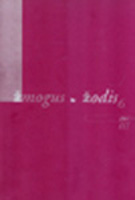Степень стяженности флексий полных (членных) форм прилагательных в Успенском сборнике XII–XIII вв.
The Phonetic Changes of Some Forms of Peonominal Adjectives in Uspenskij Corpus of the XII–XIIIth centures
Author(s): Svetlana VlasovaSubject(s): Language and Literature Studies
Published by: Vytauto Didžiojo Universitetas
Keywords: phonetic changes of some forms of pronominal adjectives; texts in Uspenskij Corpus of the 12th – 13th centuries; modern Lithuanian language;
Summary/Abstract: The article deals with the phonetic changes of some forms of pronominal adjectives. The changes are indicated in a chart and evaluated statistically. The analysis of the texts in Uspenskij Corpus of the 12th – 13th centuries enables us to speak about the important phonetic changes of pronominal forms. The oldest forms which did not undergo assimilation are not used. Instead of them assimilated forms prevail. The majority of them consist of flections which still did not undergo contraction. The domination of the latter is explained not only by real phonetic changes, but writing tradition of ecclesiastical books of that period as well. The influence of the orthography over original Uspenskij Corpus texts was less intense. As a result contracted forms are more frequent in these texts. It was noticed, that contracted forms dominate at the end of a line, especially in the original texts. In substantival adjectives non contracted forms are met more often. The blending of components in flections of pronominal adjectives is bigger in number in Uspenskij Corpus than in the modern Lithuanian language.
Journal: Žmogus ir žodis
- Issue Year: 06/2004
- Issue No: 3
- Page Range: 62-69
- Page Count: 8
- Language: Russian

